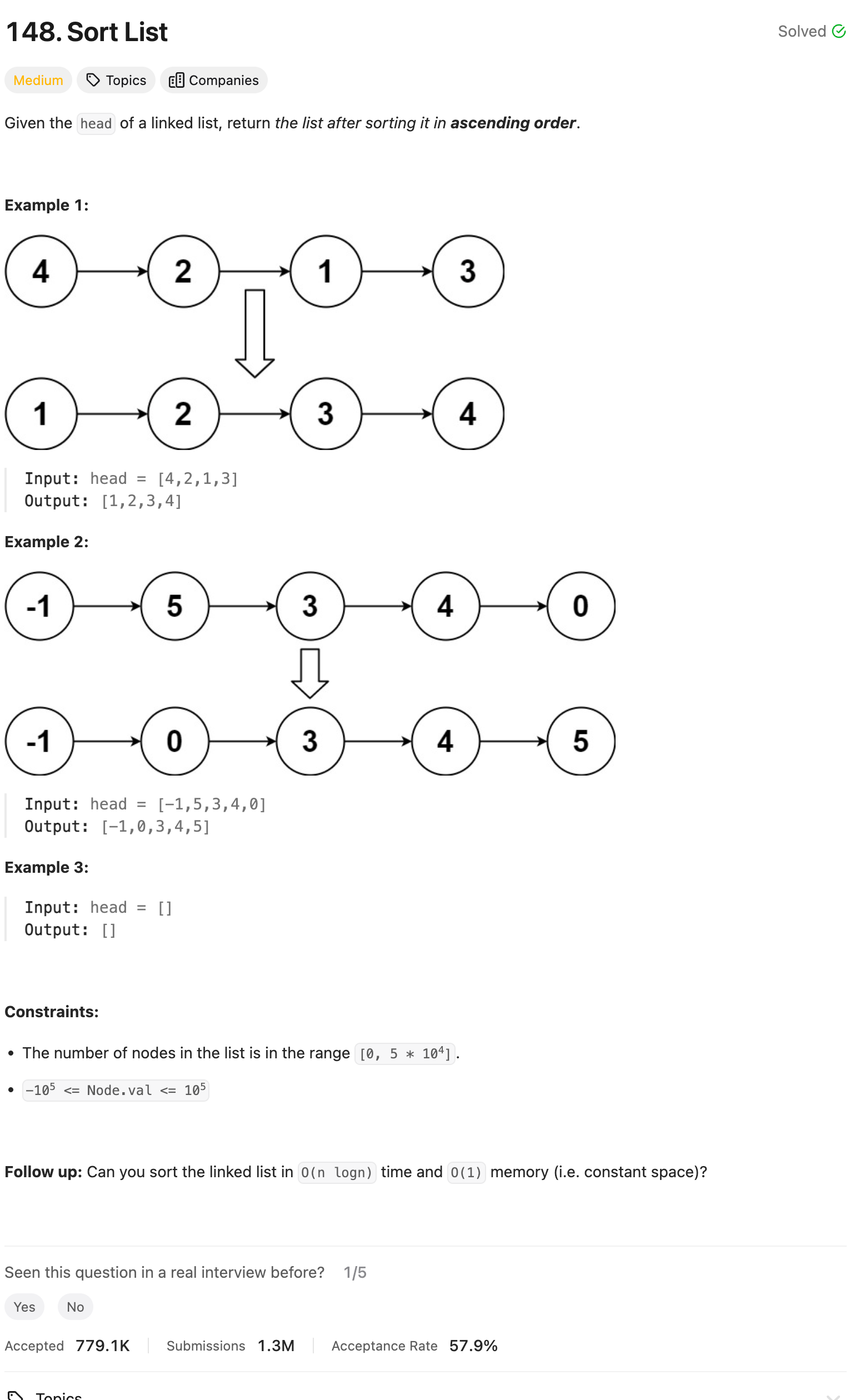Problem of The Day: Sort List
Problem Statement

Intuition
When tackling this problem, my initial thoughts revolve around the concept of merge sort, which is efficient for sorting linked lists. The idea is to recursively divide the list into smaller sublists until each sublist contains only one element, and then merge these sublists while ensuring the elements are in ascending order.
Approach
To implement this approach, I’ll define a function to split the list into two halves, find the middle node using the slow and fast pointer technique. Then, I’ll recursively sort the two halves and merge them back together in sorted order.
Complexity
-
Time complexity: O(n logn )
-
Space complexity: O(n)
Code
# Definition for singly-linked list.
# class ListNode:
# def __init__(self, val=0, next=None):
# self.val = val
# self.next = next
class Solution:
def sortList(self, head: Optional[ListNode]) -> Optional[ListNode]:
def getMiddleNode(head_node):
slow = fast = head_node
prev = None
while fast and fast.next:
prev = slow
slow = slow.next
fast = fast.next.next
return prev, slow
def merge(l1, l2):
dummy = ListNode(0)
curr = dummy
while l1 and l2:
if l1.val < l2.val:
curr.next = l1
l1 = l1.next
else:
curr.next = l2
l2 = l2.next
curr = curr.next
curr.next = l1 if l1 is not None else l2
return dummy.next
def helper(node):
if not node:
return
if node and not node.next:
return node
l1_head = node
prev, l2_head = getMiddleNode(node)
if prev:
prev.next = None
left_node = helper(l1_head)
right_node = helper(l2_head)
return merge(left_node, right_node)
return helper(head)
For following up questions - EDITORIAL SOLUTION
O(1) space complexity
class Solution:
def sortList(self, head: ListNode) -> ListNode:
if head is None or head.next is None:
return head
n = self.getCount(head)
start = head
dummyHead = ListNode()
size = 1
while size < n:
self.tail = dummyHead
while start is not None:
if start.next is None:
self.tail.next = start
break
mid = self.split(start, size)
self.merge(start, mid)
start = self.nextSubList
start = dummyHead.next
size *= 2
return dummyHead.next
def split(self, start, size):
midPrev = start
end = start.next
# Use fast and slow approach to find middle and end of second linked list
for index in range(1, size):
if end and end.next:
end = end.next.next
else:
if end:
end = end.next
if midPrev.next:
midPrev = midPrev.next
mid = midPrev.next
midPrev.next = None
self.nextSubList = end.next if end else None
if end:
end.next = None
# Return the start of second linked list
return mid
def merge(self, list1, list2):
dummyHead = ListNode()
newTail = dummyHead
while list1 and list2:
if list1.val < list2.val:
newTail.next = list1
list1 = list1.next
else:
newTail.next = list2
list2 = list2.next
newTail = newTail.next
newTail.next = list1 if list1 else list2
# Traverse till the end of merged list to get the newTail
while newTail.next:
newTail = newTail.next
# Link the old tail with the head of merged list
self.tail.next = dummyHead.next
# Update the old tail to the new tail of merged list
self.tail = newTail
def getCount(self, head):
cnt = 0
ptr = head
while ptr:
ptr = ptr.next
cnt += 1
return cnt